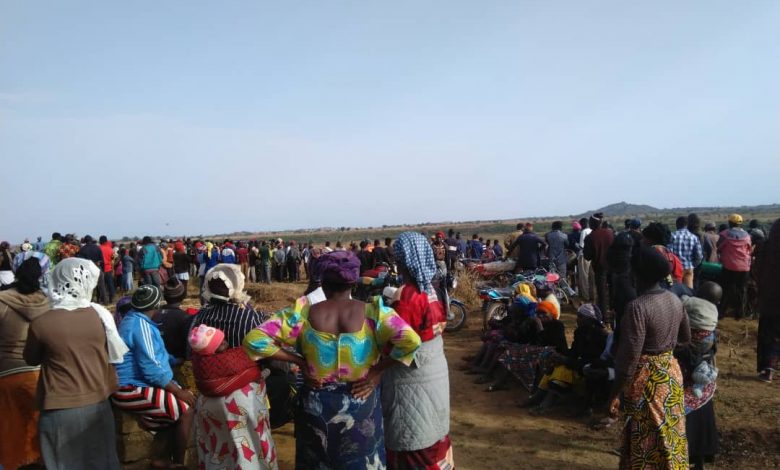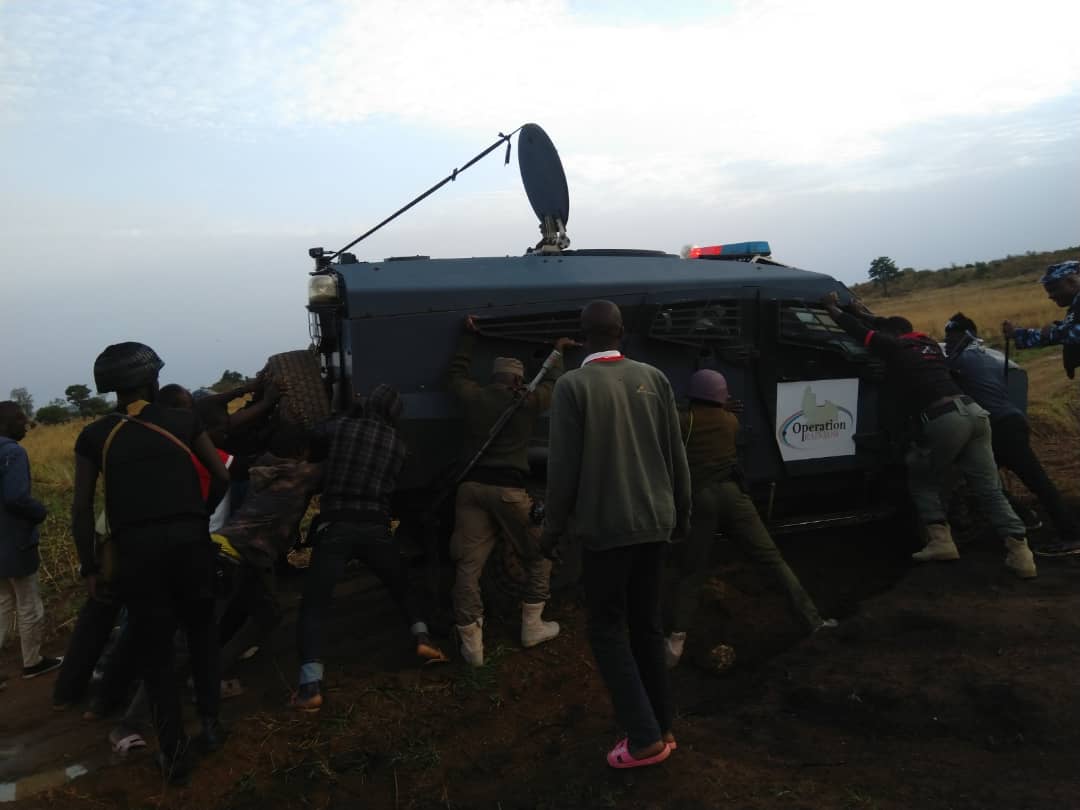Killings and More Killings Turn Plateau Villages to Grave Yards

On Saturday, March 21, two soldiers on routine security monitoring duty did not return to base. They were ambushed, hacked to death and their bodies dumped by the roadside.
Their assailants made away with their service rifles and other military combat accessories on them.
The soldiers were on deployment to communities in Bassa Local Government Area of Plateau State which has witnessed mass murders in the recent past.
Such assignment is called “isolated deployment” in Military parlance.
The attackers also killed two villagers from Katummai village in the area.
Bassa communities are among the flashpoints of unrestrained communal banditry and killings by invading militias in Plateaus in the last few years. The killings dragged for years but abated early in 2019.
The soldiers were attacked on their way to Ancha passing through Hukke in the area.
They were ambushed by armed militia men who pounced on them with swift and vicious cruelty, disarmed and hacked them to death.
As swiftly as they came, the attackers beat a retreat, melting without any trace into the wild bushes.
The the soldiers, whose identities the Nigerian Army is unwilling to make public, were in Bassa as part of the Operation Safe Haven (OPSH) activities within the territories of Katummai and Hukke villages.
The OPSH was set up to check incessant killings among communities in Plateau and restore law and order.
The Nigerian Army Headquarters responded with some curious steps, first, keeping sealed lips, not making any public statement on the matter.
Second, the Army quietly redeployed Major-Gen. Augustine Agundu, the Commander of OPSH, replaced him with Maj.-Gen. C C Okonkwo, and withdrew military presence from the area.
Now assured that their breach of the military assets carried no consequences, the militia regrouped for more sustained, deadly attacks on communities.
Officials of the state government did not comment on the development and all legislators representing the area at the local, state and federal levels failed to talk too.
Without any security to ward off future threats, the villagers were easy prey as they became the proverbial sitting duck, picked at random by the enemy.
If the Nigeria Police Force command in the state noticed anything, it did not make it public.
Kennedy Romans, the Police officer in-charge of the Local Government Area told HumAngle that his men frequently patrolled communities in the area but was not ready to share information on security issues.
There was no official outrage or effort by security authorities to shield the communities following early signals of danger. Thus fear and anxiety took over in the communities.
Worried villagers cried out and counted the days and hours in despair.
Each day, as darkness fell on the plains of Rigweland, an indigenous pastoral farming people of Plateau State in North Central Nigeria, fear gripped the people.
Two days after the killing of the soldiers and villagers in Katummai village, the band invaded Mgbrazongo village.
Evidently, the two days interval between its first attack and the one on March 23 in Mgbrazongo was to assess the response of the military and the villagers.
Seeing that the Army was acting like a terrified dog with its tail in-between its legs, the militia went on full rampage.
In Mgbrazango, the invaders targeted the economic assets of the community, burning down houses, farms, and farm stocks in barns.
They left behind three fatalities -a one-year-and-five-month-old baby, Charity, three-year-old Jacob and six-year-old Rachel Elisha.
And so the hard earned period of quietude and slim peace in Bassa communities snapped effortlessly. The season of the cycle of heartless human slaughters, wailings and mass burials returned .
That night, some of the villagers were still preparing their supper when the invaders struck.
Taken completely unaware, only healthier or younger members of the community had the reflex to duck instinctively through the gunshots that announced the danger at hand.
The more feeble – the elderly, women and children – ended up as casualties, slaughtered by a ruthless, heartless band of invaders.
The same night, the invaders moved to Kperie village where they murdered two elderly women who were mourning a family member. The victims were Deh Thomas Breh, 78, and Uho Wuze, 71 years old.
Two other members of the community, Utu Gah, 84, and Friday Yakubu, 30, who sustained injuries, were hospitalized.
On Tuesday, March 31, the killers invaded Ancha, another community, and killed three villagers, razed 17 houses as well as several barns of harvest stocks.
The victims were 30-year-old Iho Musa, who was carrying a three months old pregnancy, 65 years old Avia Rivi, and 45 years old Gado Abba.
Three others were hospitalized following injuries from gunshots. They are Musa David, whose wife carrying a three months old pregnancy was killed, Danlami Gado and Danlami James.
The killers showed consistent ruthlessness and unfailing predictability in the manner they picked their victims.
That neither the police nor the military formation has made any breakthrough in unmasking the faces behind the killings is a mystery.
The communities find that they are caught between the devil and the deep sea as they cannot get help, sympathy or compassion from anywhere.
They are left all alone to a certain, ignoble fate -death.
Not troubled by any thoughts of encountering a superior counterforce, the gang also invaded Hukke on April 1.
Eyewitnesses said that about 300 armed men invaded the village about 7.10 pm.
They razed down 23 houses and killed seven elderly members of the community.
The victims include Izinpa Muntu, 72, Madah Imeh, 80, Jummai Geye, 78, Gado Muntu, 67, Mary Alhassa ,70, Gado Ngulu, 90, and Rigwe Muntu, 84 years old.
The militia did not spare a neighboring community, Irigwe, the same night, torching houses.
On the same day, the band met two young men in Nkyiedongwro village as they were returning from where they labored all day molding bricks to earn a living and murdered them.
On April 3, the murderers turned on Nkiegoro, killing three and torching 33 houses, including an ECWA Church and an LEA Primary School building as well as several farm stock barns.
HumAngle spoke with some victims and community leaders in Bassa following the series of attacks.
The people said that community activities in several villages had turned to moments for singing dirges, sending condolence messages and retiring to await news of the next victims.
Ishaya Goh, who said he witnessed the invasion in Ancha points fingers at the Fulani community.
There is a large community of Fulani herdsmen in Bassa dwelling in the part of the space called Funturi, carved up by Rukuba community, an indigenous pastoral farming people.
Their presence at Funturi has been a source of tension among Rukuba and the Fulani community on the one hand and communities of Rigweland in Bassa on the other hand.
Goh said he heard the invaders speaking Fulfude, the ethnic language of the Fulani, while a few of them spoke Rukuba. He said he heard them from where he hid.
David Chinge, the Chairman of Miango Youth Development Association, accused the Fulani of killing the soldiers and launching a campaign of ethnic cleansing on the indigenous people of Rigweland.
He said about 1,500 people had been displaced from their homes.
Eyewitnesses from Hukke where the attack has occurred four times since March, also accused the Fulani and their herders of staging a killing orgy against the indigenous communities.
On April 3, the President of Irigwe Development Association, Hon. Sunday Abu, flanked by the paramount ruler of Rigwe, Rev. Ronku Aka, addressed the press and accused the Fulani of aggression against his people.
He declared: “while our people have continued to remain indoors and law abiding in the wake of the national outcry over the (coronavirus), the assailants, Fulani herdsmen, have continued each day within the last two weeks to visit us with mayhem.”
HumAngle sought to reach out to the Robuka community but was advised against such a move in the light of the prevailing tension.
A security contact queried a HumanAngle reporter in pidgin English: “if Army wey carry gun dey withdraw from the area, na you want carry pen go for there?”
HumAngle reached out to Lt.-Col. Ayoola of the OPSH but he declined to answer questions posed to him. Instead , he referred the reporter to the OPSH headquarters in Jos.
Agundu who was commander of OPSH, confirmed that the soldiers were killed but declined to reveal their identities. He said he had handed over to a new helmsman.
At the OPSH headquarters, the Chief of Staff to the commander, Brig.-Gen. Barnabas Sakaba, also confirmed the murder of the soldiers but declined to reveal their identities.
He, however, said that the Army had not withdrawn operations in the area.
Sakaba said that instead the Army was “conducting clearance operations in the area and that troops were still stationed there.”
Sources within the OPSH familiar with the scope and range of the “clearance operation” informed HumAngle that the service riffles of the slain soldiers were recovered on Sunday, April 5, within the precincts of the communities in Rokuba and Funturi.
HumanAngle had contacted the Office of the Governor of Plateau State in Jos on April 3 for comments on the killings but no one agreed to speak.
But on Wednesday, April 8, when the killers attacked Mgbrazongo and raided four villages, the governor dispatched a Commissioner, Aku Abbey, to commiserate with the paramount ruler of Rigwe, Rev. Aka.
The attackers had killed Pastor Matthew Tagwai, 34, of ECWA Church, 21-year-old Dir Sunday, 38-year-old Duh Abba and 10-year-old Ishaku Abba on the occasion.
On Thursday, April 9, Governor Simon Lalong in a statement signed by Dr Makut Simon Macham, his Director of Press and Public Affairs, said that “government will not tolerate these senseless acts of murder unleashed on innocent citizens.”
Lalong said he had “directed traditional and community leaders to cooperate with security agencies in identifying these attackers who cannot be shielded as these attacks have persisted in recent weeks, a situation that is highly unacceptable to my administration.”
The governor further confirmed that “communities in Bassa Local Government recently came under attack where lives, properties and livestock were lost.”
The “clearance operation” by the Army, according to sources familiar with the military activities, has not resulted in any arrests.

However, on Friday, April 10, the Army questioned Moses Gata, an outspoken youth leader in one of the villages, at his residence.
Gata, after his release the same day posted on his Facebook account : “It was exactly 3.25pm on (10/04/2020) that more than a dozen soldiers (swooped on) my residence, took me to their base, put me into a running tap, asked me to roll on a wet floor, manhandling me like (I was) a criminal.”
He claimed that the soldiers accused him of inciting his community against the Army.
Additional reporting by Murtala Abdullahi
Support Our Journalism
There are millions of ordinary people affected by conflict in Africa whose stories are missing in the mainstream media. HumAngle is determined to tell those challenging and under-reported stories, hoping that the people impacted by these conflicts will find the safety and security they deserve.
To ensure that we continue to provide public service coverage, we have a small favour to ask you. We want you to be part of our journalistic endeavour by contributing a token to us.
Your donation will further promote a robust, free, and independent media.
Donate HereStay Closer To The Stories That Matter




